Abstract
OBJECTIVE: To investigate the effects of two different dosage regimens of botulinum toxin to induce healing in patients with idiopathic anal fissure. SUMMARY BACKGROUND DATA: Chronic anal fissure is maintained by contraction of the internal anal sphincter. Sphincterotomy, which is successful in 85% to 95% of patients, permanently weakens the sphincter and therefore might be associated with anal deformity and incontinence. METHODS: Fifty-seven consecutive outpatients were evaluated. Type A botulinum toxin was injected into the internal anal sphincter. RESULTS: Patients were divided into two treatment groups based on the number of botulinum toxin units injected. Patients in the first group were treated with 15 units and retreated with 20 units. Patients in the second group were treated with 20 units and retreated with 25 units. Two months after treatment, 10 patients in the first group and 23 patients in the second group had a healing scar. Symptomatic improvement was observed in 13 patients in the first group and in 24 patients in the second group. Statistical analysis showed that resting anal pressure varied from baseline values as a function of treatment; in contrast, the treatment had no effect on maximum voluntary pressure. Long-term healing was achieved in 13 patients in the first group and in all patients in the second group who underwent a complete treatment. CONCLUSIONS: Botulinum toxin is safe and effective in the treatment of anal fissure. It is less expensive and easier to perform than surgical treatment. No adverse effects resulted from injections of the toxin. The higher dosage is effective in producing long-term healing without complications.
Full text
PDF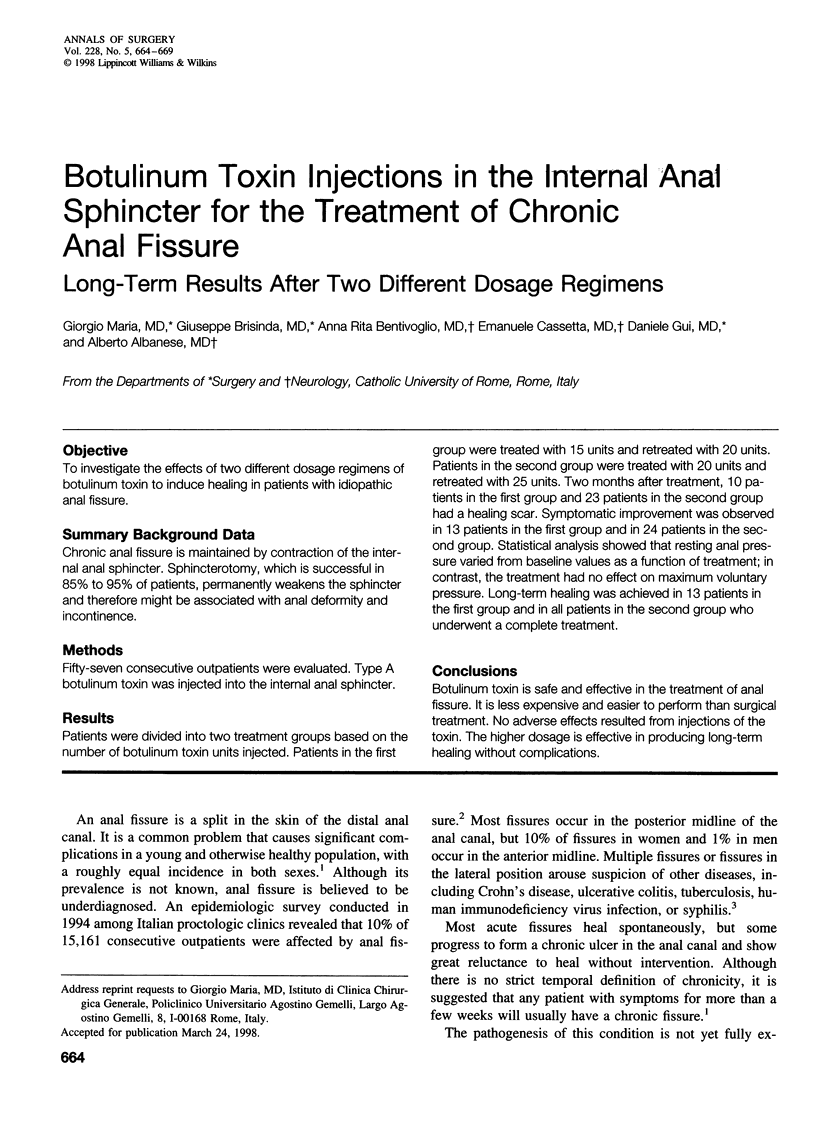
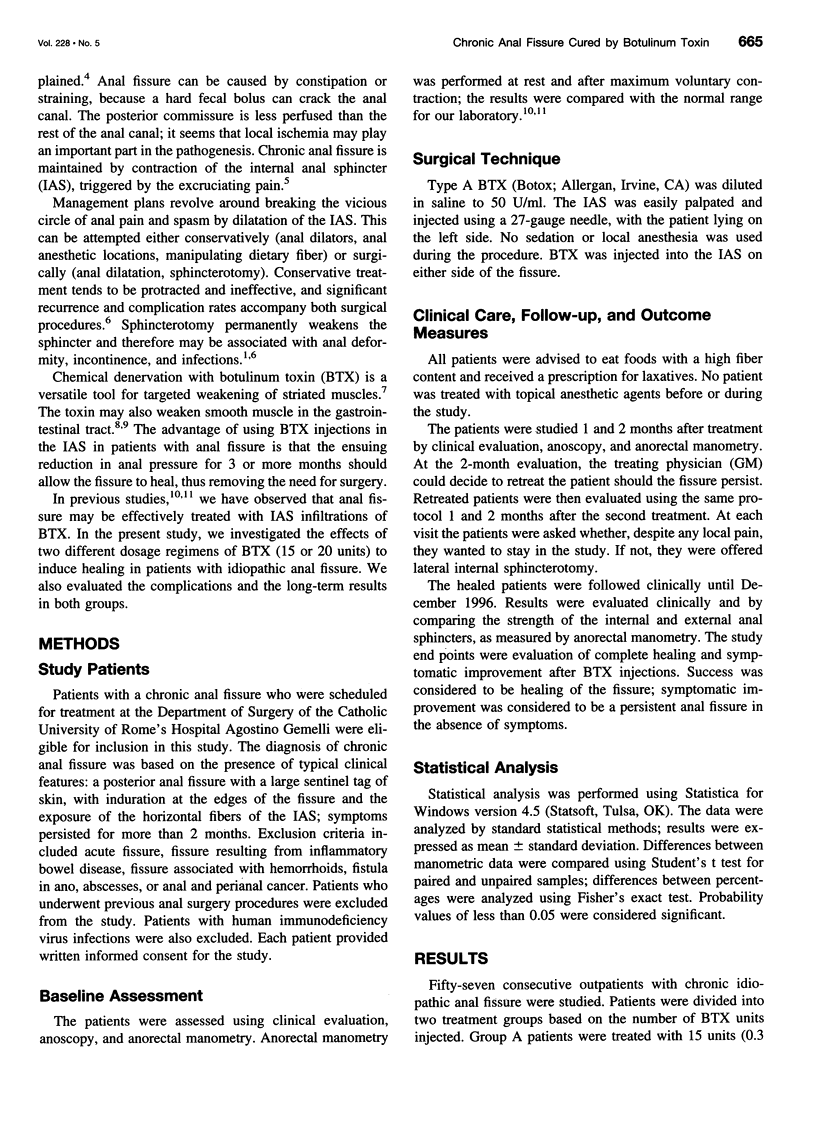
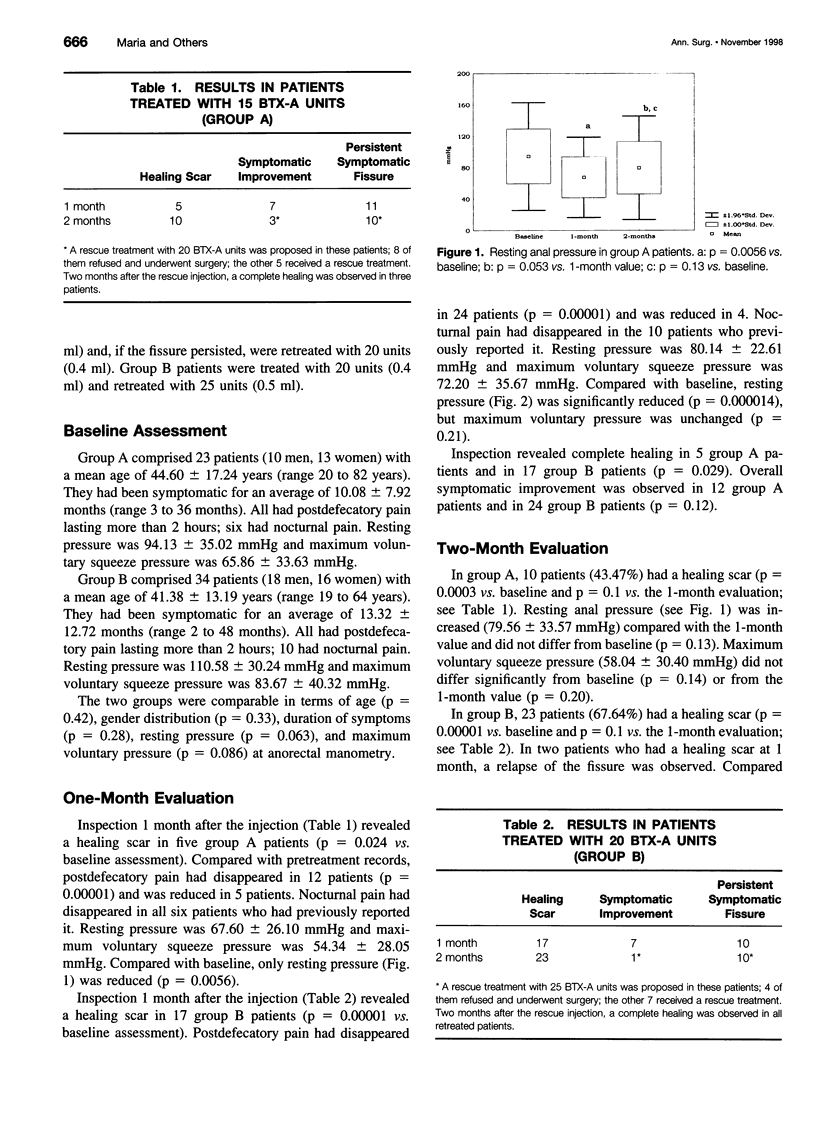
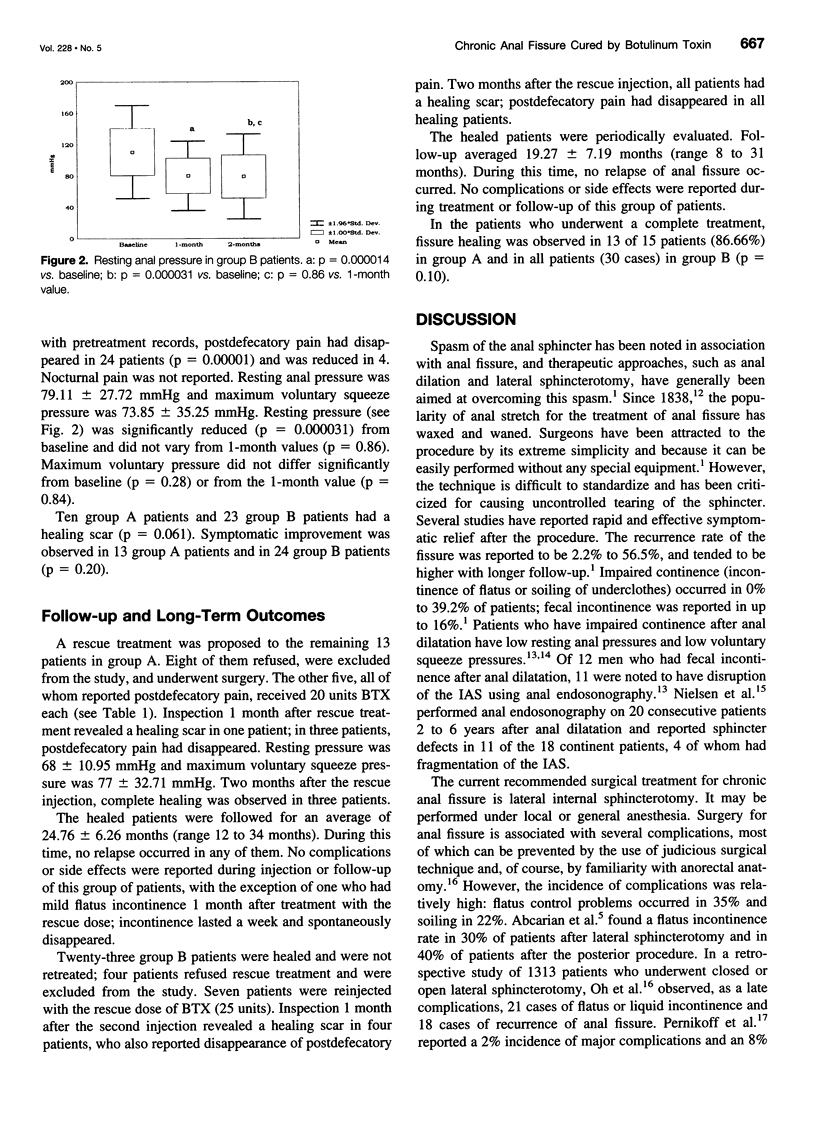
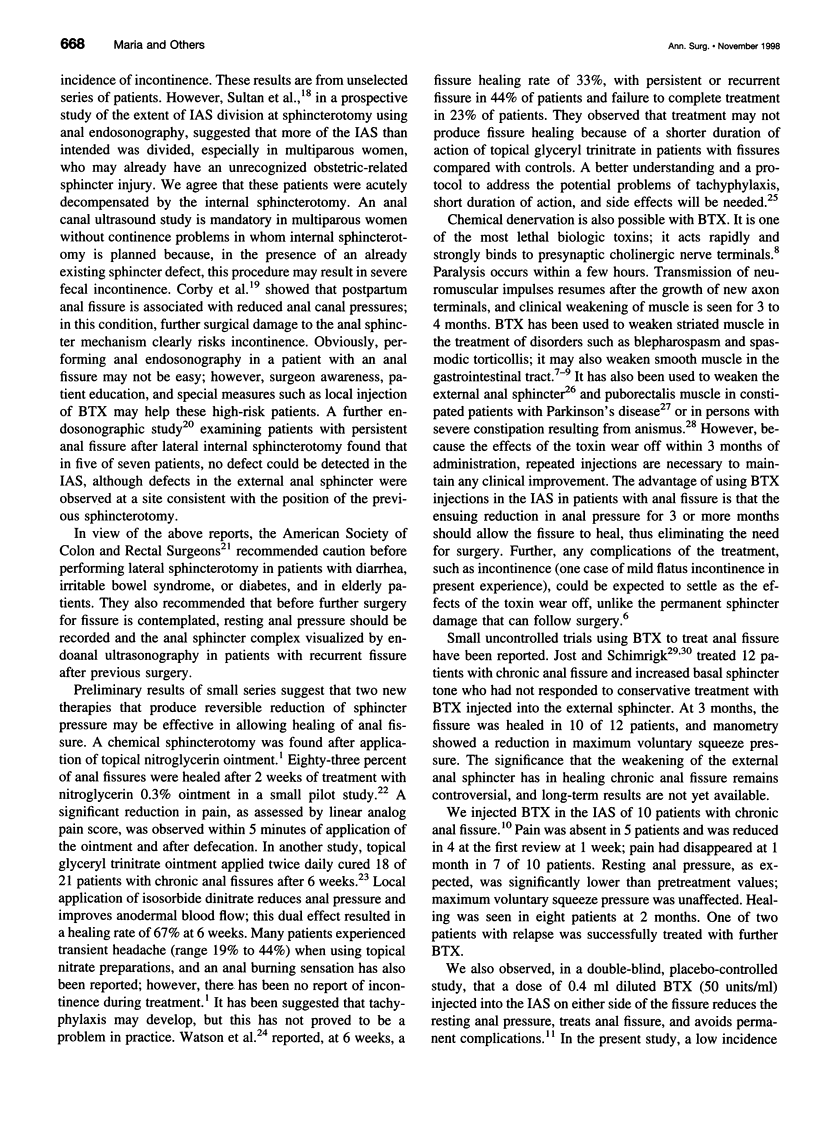
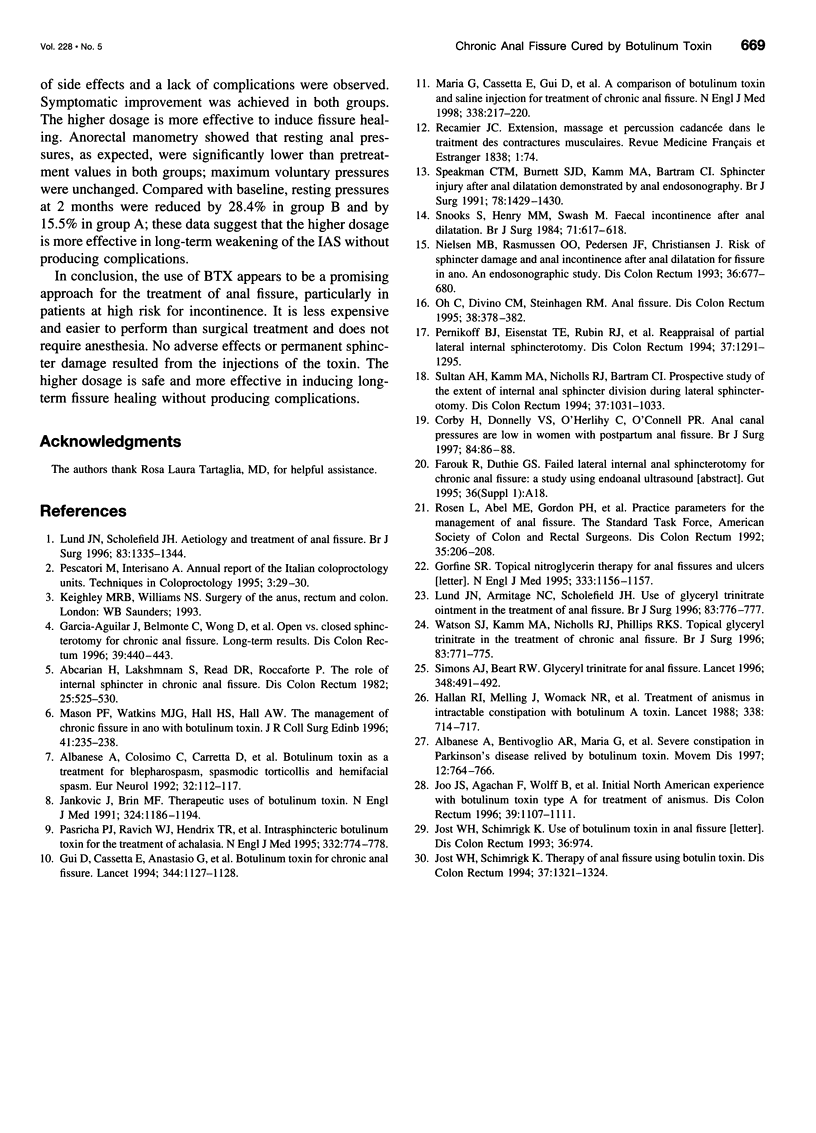
Selected References
These references are in PubMed. This may not be the complete list of references from this article.
- Abcarian H., Lakshmanan S., Read D. R., Roccaforte P. The role of internal sphincter in chronic anal fissures. Dis Colon Rectum. 1982 Sep;25(6):525–528. doi: 10.1007/BF02564159. [DOI] [PubMed] [Google Scholar]
- Albanese A., Colosimo C., Carretta D., Dickmann A., Bentivoglio A. R., Tonali P. Botulinum toxin as a treatment for blepharospasm, spasmodic torticollis and hemifacial spasm. Eur Neurol. 1992;32(2):112–117. doi: 10.1159/000116805. [DOI] [PubMed] [Google Scholar]
- Albanese A., Maria G., Bentivoglio A. R., Brisinda G., Cassetta E., Tonali P. Severe constipation in Parkinson's disease relieved by botulinum toxin. Mov Disord. 1997 Sep;12(5):764–766. doi: 10.1002/mds.870120524. [DOI] [PubMed] [Google Scholar]
- Corby H., Donnelly V. S., O'Herlihy C., O'Connell P. R. Anal canal pressures are low in women with postpartum anal fissure. Br J Surg. 1997 Jan;84(1):86–88. doi: 10.1046/j.1365-2168.1997.02484.x. [DOI] [PubMed] [Google Scholar]
- Garcia-Aguilar J., Belmonte C., Wong W. D., Lowry A. C., Madoff R. D. Open vs. closed sphincterotomy for chronic anal fissure: long-term results. Dis Colon Rectum. 1996 Apr;39(4):440–443. doi: 10.1007/BF02054061. [DOI] [PubMed] [Google Scholar]
- Gorfine S. R. Topical nitroglycerin therapy for anal fissures and ulcers. N Engl J Med. 1995 Oct 26;333(17):1156–1157. doi: 10.1056/NEJM199510263331718. [DOI] [PubMed] [Google Scholar]
- Gui D., Cassetta E., Anastasio G., Bentivoglio A. R., Maria G., Albanese A. Botulinum toxin for chronic anal fissure. Lancet. 1994 Oct 22;344(8930):1127–1128. doi: 10.1016/s0140-6736(94)90633-5. [DOI] [PubMed] [Google Scholar]
- Hallan R. I., Williams N. S., Melling J., Waldron D. J., Womack N. R., Morrison J. F. Treatment of anismus in intractable constipation with botulinum A toxin. Lancet. 1988 Sep 24;2(8613):714–717. doi: 10.1016/s0140-6736(88)90188-2. [DOI] [PubMed] [Google Scholar]
- Jankovic J., Brin M. F. Therapeutic uses of botulinum toxin. N Engl J Med. 1991 Apr 25;324(17):1186–1194. doi: 10.1056/NEJM199104253241707. [DOI] [PubMed] [Google Scholar]
- Joo J. S., Agachan F., Wolff B., Nogueras J. J., Wexner S. D. Initial North American experience with botulinum toxin type A for treatment of anismus. Dis Colon Rectum. 1996 Oct;39(10):1107–1111. doi: 10.1007/BF02081409. [DOI] [PubMed] [Google Scholar]
- Jost W. H., Schimrigk K. Therapy of anal fissure using botulin toxin. Dis Colon Rectum. 1994 Dec;37(12):1321–1324. doi: 10.1007/BF02257805. [DOI] [PubMed] [Google Scholar]
- Jost W. H., Schimrigk K. Use of botulinum toxin in anal fissure. Dis Colon Rectum. 1993 Oct;36(10):974–974. doi: 10.1007/BF02050639. [DOI] [PubMed] [Google Scholar]
- Lund J. N., Armitage N. C., Scholefield J. H. Use of glyceryl trinitrate ointment in the treatment of anal fissure. Br J Surg. 1996 Jun;83(6):776–777. doi: 10.1002/bjs.1800830615. [DOI] [PubMed] [Google Scholar]
- Lund J. N., Scholefield J. H. Aetiology and treatment of anal fissure. Br J Surg. 1996 Oct;83(10):1335–1344. doi: 10.1002/bjs.1800831006. [DOI] [PubMed] [Google Scholar]
- Maria G., Cassetta E., Gui D., Brisinda G., Bentivoglio A. R., Albanese A. A comparison of botulinum toxin and saline for the treatment of chronic anal fissure. N Engl J Med. 1998 Jan 22;338(4):217–220. doi: 10.1056/NEJM199801223380402. [DOI] [PubMed] [Google Scholar]
- Mason P. F., Watkins M. J., Hall H. S., Hall A. W. The management of chronic fissure in-ano with botulinum toxin. J R Coll Surg Edinb. 1996 Aug;41(4):235–238. [PubMed] [Google Scholar]
- Nielsen M. B., Rasmussen O. O., Pedersen J. F., Christiansen J. Risk of sphincter damage and anal incontinence after anal dilatation for fissure-in-ano. An endosonographic study. Dis Colon Rectum. 1993 Jul;36(7):677–680. doi: 10.1007/BF02238595. [DOI] [PubMed] [Google Scholar]
- Oh C., Divino C. M., Steinhagen R. M. Anal fissure. 20-year experience. Dis Colon Rectum. 1995 Apr;38(4):378–382. doi: 10.1007/BF02054225. [DOI] [PubMed] [Google Scholar]
- Pasricha P. J., Ravich W. J., Hendrix T. R., Sostre S., Jones B., Kalloo A. N. Intrasphincteric botulinum toxin for the treatment of achalasia. N Engl J Med. 1995 Mar 23;332(12):774–778. doi: 10.1056/NEJM199503233321203. [DOI] [PubMed] [Google Scholar]
- Pernikoff B. J., Eisenstat T. E., Rubin R. J., Oliver G. C., Salvati E. P. Reappraisal of partial lateral internal sphincterotomy. Dis Colon Rectum. 1994 Dec;37(12):1291–1295. doi: 10.1007/BF02257799. [DOI] [PubMed] [Google Scholar]
- Rosen L., Abel M. E., Gordon P. H., Denstman F. J., Fleshman J. W., Hicks T. C., Huber P. J., Kennedy H. L., Levin S. E., Nicholson J. D. Practice parameters for the management of anal fissure. The Standards Task Force American Society of Colon and Rectal Surgeons. Dis Colon Rectum. 1992 Feb;35(2):206–208. doi: 10.1007/BF02050683. [DOI] [PubMed] [Google Scholar]
- Simons A. J., Beart R. W., Jr Glyceryl trinitrate for anal fissure. Lancet. 1996 Aug 24;348(9026):491–492. doi: 10.1016/S0140-6736(05)64667-3. [DOI] [PubMed] [Google Scholar]
- Snooks S., Henry M. M., Swash M. Faecal incontinence after anal dilatation. Br J Surg. 1984 Aug;71(8):617–618. doi: 10.1002/bjs.1800710818. [DOI] [PubMed] [Google Scholar]
- Speakman C. T., Burnett S. J., Kamm M. A., Bartram C. I. Sphincter injury after anal dilatation demonstrated by anal endosonography. Br J Surg. 1991 Dec;78(12):1429–1430. doi: 10.1002/bjs.1800781206. [DOI] [PubMed] [Google Scholar]
- Sultan A. H., Kamm M. A., Nicholls R. J., Bartram C. I. Prospective study of the extent of internal anal sphincter division during lateral sphincterotomy. Dis Colon Rectum. 1994 Oct;37(10):1031–1033. doi: 10.1007/BF02049319. [DOI] [PubMed] [Google Scholar]
- Watson S. J., Kamm M. A., Nicholls R. J., Phillips R. K. Topical glyceryl trinitrate in the treatment of chronic anal fissure. Br J Surg. 1996 Jun;83(6):771–775. doi: 10.1002/bjs.1800830614. [DOI] [PubMed] [Google Scholar]


